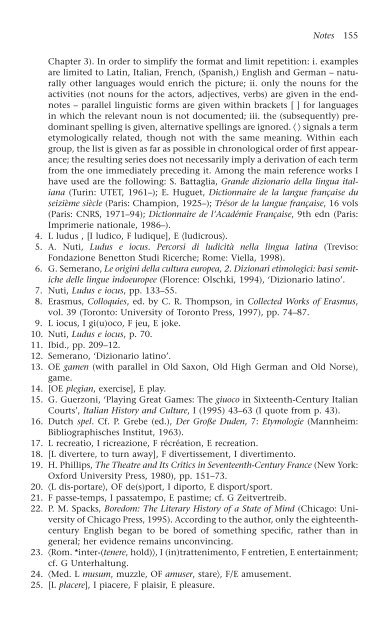Recreation in the Renaissance
Recreation in the Renaissance
Recreation in the Renaissance
- No tags were found...
Create successful ePaper yourself
Turn your PDF publications into a flip-book with our unique Google optimized e-Paper software.
Notes 155<br />
Chapter 3). In order to simplify <strong>the</strong> format and limit repetition: i. examples<br />
are limited to Lat<strong>in</strong>, Italian, French, (Spanish,) English and German – naturally<br />
o<strong>the</strong>r languages would enrich <strong>the</strong> picture; ii. only <strong>the</strong> nouns for <strong>the</strong><br />
activities (not nouns for <strong>the</strong> actors, adjectives, verbs) are given <strong>in</strong> <strong>the</strong> endnotes<br />
– parallel l<strong>in</strong>guistic forms are given with<strong>in</strong> brackets [ ] for languages<br />
<strong>in</strong> which <strong>the</strong> relevant noun is not documented; iii. <strong>the</strong> (subsequently) predom<strong>in</strong>ant<br />
spell<strong>in</strong>g is given, alternative spell<strong>in</strong>gs are ignored. · Ò signals a term<br />
etymologically related, though not with <strong>the</strong> same mean<strong>in</strong>g. With<strong>in</strong> each<br />
group, <strong>the</strong> list is given as far as possible <strong>in</strong> chronological order of first appearance;<br />
<strong>the</strong> result<strong>in</strong>g series does not necessarily imply a derivation of each term<br />
from <strong>the</strong> one immediately preced<strong>in</strong>g it. Among <strong>the</strong> ma<strong>in</strong> reference works I<br />
have used are <strong>the</strong> follow<strong>in</strong>g: S. Battaglia, Grande dizionario della l<strong>in</strong>gua italiana<br />
(Tur<strong>in</strong>: UTET, 1961–); E. Huguet, Dictionnaire de la langue française du<br />
seizième siècle (Paris: Champion, 1925–); Trésor de la langue française, 16 vols<br />
(Paris: CNRS, 1971–94); Dictionnaire de l’Académie Française, 9th edn (Paris:<br />
Imprimerie nationale, 1986–).<br />
4. L ludus , [I ludico, F ludique], E ·ludicrousÒ.<br />
5. A. Nuti, Ludus e iocus. Percorsi di ludicità nella l<strong>in</strong>gua lat<strong>in</strong>a (Treviso:<br />
Fondazione Benetton Studi Ricerche; Rome: Viella, 1998).<br />
6. G. Semerano, Le orig<strong>in</strong>i della cultura europea, 2. Dizionari etimologici: basi semitiche<br />
delle l<strong>in</strong>gue <strong>in</strong>doeuropee (Florence: Olschki, 1994), ‘Dizionario lat<strong>in</strong>o’.<br />
7. Nuti, Ludus e iocus, pp. 133–55.<br />
8. Erasmus, Colloquies, ed. by C. R. Thompson, <strong>in</strong> Collected Works of Erasmus,<br />
vol. 39 (Toronto: University of Toronto Press, 1997), pp. 74–87.<br />
9. L iocus, I gi(u)oco, F jeu, E joke.<br />
10. Nuti, Ludus e iocus, p. 70.<br />
11. Ibid., pp. 209–12.<br />
12. Semerano, ‘Dizionario lat<strong>in</strong>o’.<br />
13. OE gamen (with parallel <strong>in</strong> Old Saxon, Old High German and Old Norse),<br />
game.<br />
14. [OE plegian, exercise], E play.<br />
15. G. Guerzoni, ‘Play<strong>in</strong>g Great Games: The giuoco <strong>in</strong> Sixteenth-Century Italian<br />
Courts’, Italian History and Culture, I (1995) 43–63 (I quote from p. 43).<br />
16. Dutch spel. Cf. P. Grebe (ed.), Der Große Duden, 7: Etymologie (Mannheim:<br />
Bibliographisches Institut, 1963).<br />
17. L recreatio, I ricreazione, F récréation, E recreation.<br />
18. [L divertere, to turn away], F divertissement, I divertimento.<br />
19. H. Phillips, The Theatre and Its Critics <strong>in</strong> Seventeenth-Century France (New York:<br />
Oxford University Press, 1980), pp. 151–73.<br />
20. ·L dis-portareÒ, OF de(s)port, I diporto, E disport/sport.<br />
21. F passe-temps, I passatempo, E pastime; cf. G Zeitvertreib.<br />
22. P. M. Spacks, Boredom: The Literary History of a State of M<strong>in</strong>d (Chicago: University<br />
of Chicago Press, 1995). Accord<strong>in</strong>g to <strong>the</strong> author, only <strong>the</strong> eighteenthcentury<br />
English began to be bored of someth<strong>in</strong>g specific, ra<strong>the</strong>r than <strong>in</strong><br />
general; her evidence rema<strong>in</strong>s unconv<strong>in</strong>c<strong>in</strong>g.<br />
23. ·Rom. *<strong>in</strong>ter-(tenere, hold)Ò, I (<strong>in</strong>)trattenimento, F entretien, E enterta<strong>in</strong>ment;<br />
cf. G Unterhaltung.<br />
24. ·Med. L musum, muzzle, OF amuser, stareÒ, F/E amusement.<br />
25. [L placere], I piacere, F plaisir, E pleasure.










